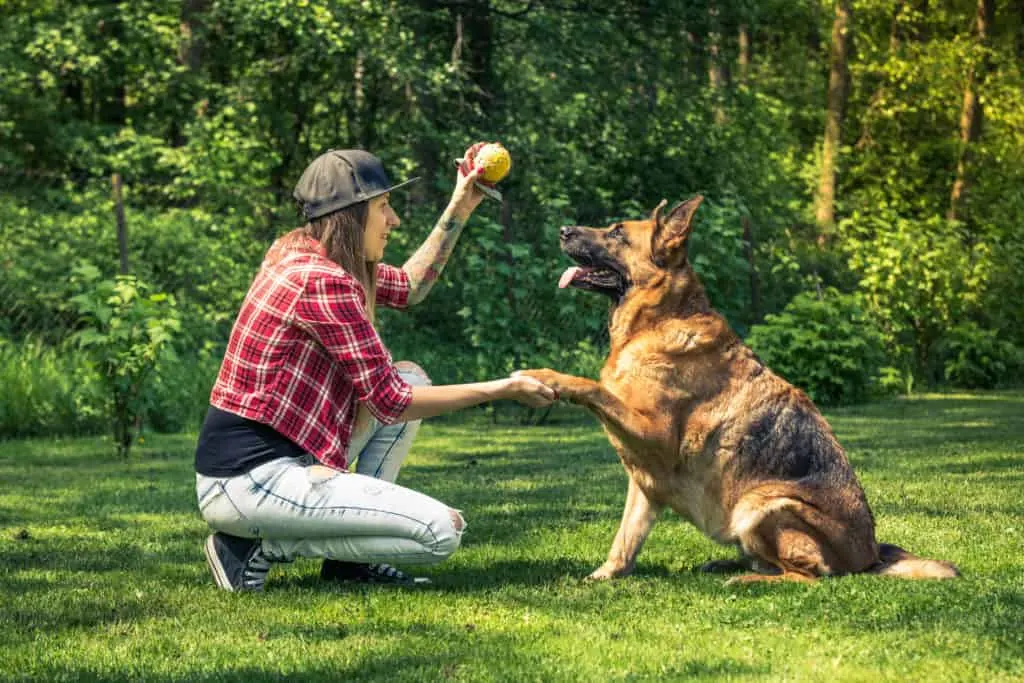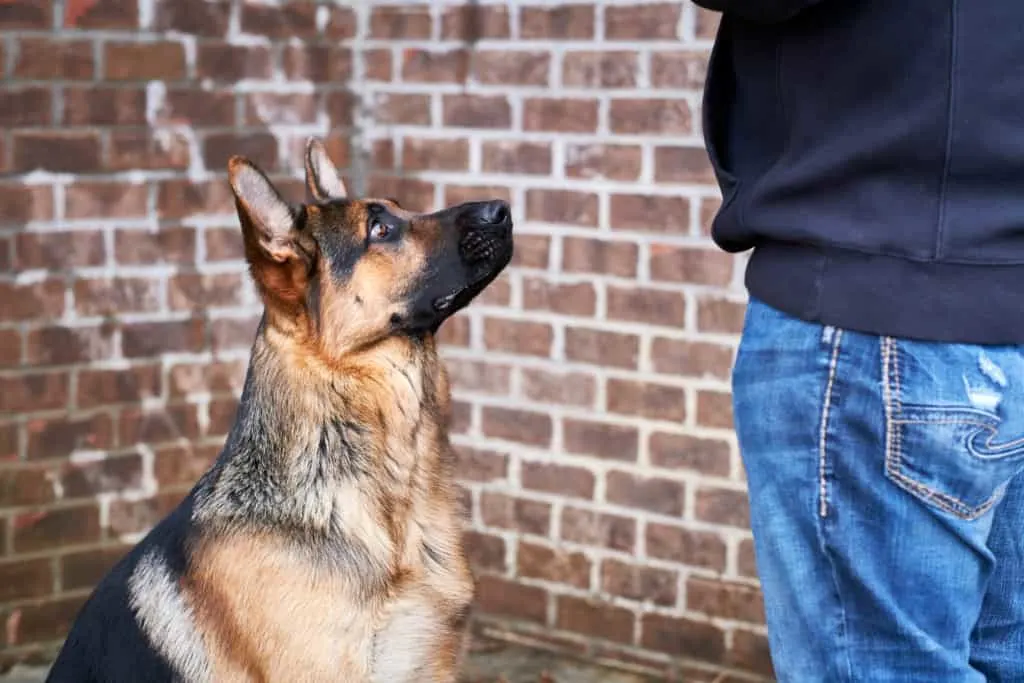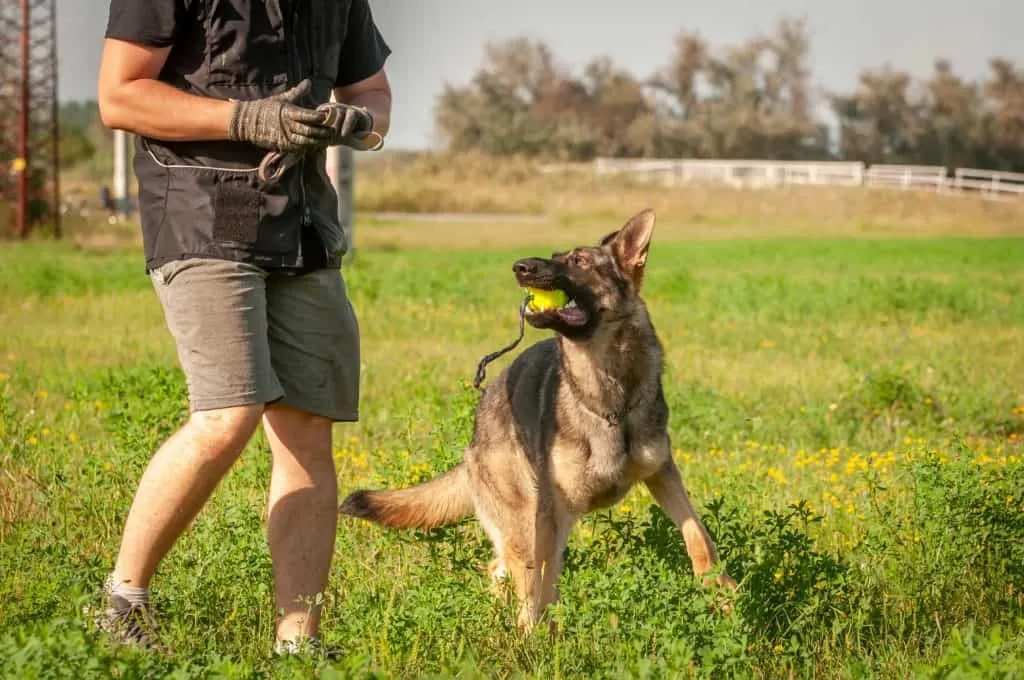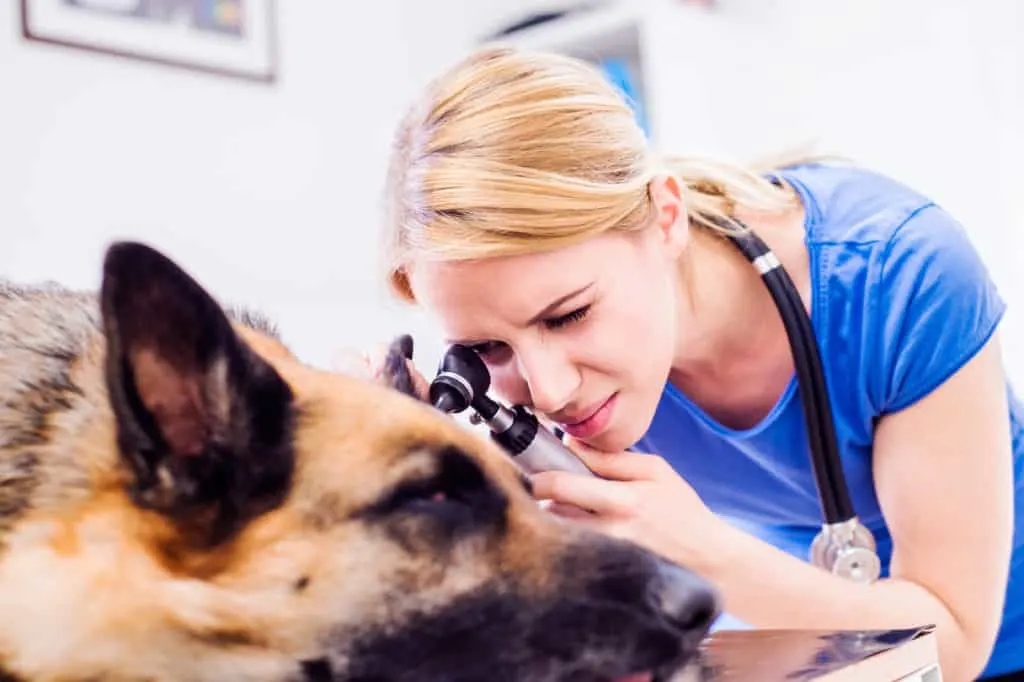
So often people want a German Shepherd in their lives because of how they have seen the breed portrayed in the media, or they may want one simply because they have seen other owners with their GSDs and they just feel an instant draw.
These reasons aren’t without merit – GSDs are actually incredibly smart and hardworking dogs, just as seen on TV. And they are great dogs to own for many other reasons as well.
But, too often GSDs are neglected or given up for adoption because the decision to get one was primarily based on emotion, rather than giving due consideration to the actual needs of a GSD.
The owner failed to evaluate other critical factors like whether they had the time, patience, and finances to actually take care of a German Shepherd.
Here we will give you some really important questions to ask yourself before you make the decision to get a German Shepherd.
And it is important that you do take the time to ask these questions of yourself, as this is a decision that will affect your life, possibly your family’s life, and certainly your dog’s life.
Click Here to Jump to a Section
Why Do You Want a German Shepherd in the First Place?
This is the first and most basic question that you need to ask yourself before getting a GSD. While it may be simple, it is far from trivial.
People often want and too often get a GSD for the wrong reasons.
You may read articles or watch videos about how talented, loyal, and hard-working German Shepherds are, but these are not reasons enough to take the leap of actually getting a GSD.
In fact, taking a leap when considering getting any dog, especially a German Shepherd, is the last thing that you should do.
It’s beyond important for both you and your future dog that you do your research, and understand everything possible relating to the breed.
So do not allow yourself to fall in love with the idea of owning a German Shepherd, as many first-time dog owners find this to be in stark contrast to the realities of actual dog ownership.
Who Will Take Care of Your German Shepherd?

This is an important question to consider when getting a dog for your family, and especially a family with younger children.
What’s more exciting for a child than the prospect of a big and cuddly new best friend?
Kids are overjoyed at the thought of getting a dog, and it can be very difficult as a loving parent to resist your children’s constant reminders of how much better their lives would be if you were to get them a dog.
I can recall a time when I was hiking with my German Shepherd and we were passing a young girl and her father. The moment that she laid eyes on my dog, her words were not “wow, look at that dog,” or “can I pet it?” Instead, her reaction was an immediate demand – “dad I want a dog!”
Along with endless pleas to get a dog, your children will undoubtedly make many well-intentioned promises about how well they will take care of their new dog.
They will likely tell you that they will take full responsibility for feeding and walking their new dog, and care for every other need that it may have.
But you need to look at the reality – and in reality, these promises actually being fulfilled may not happen as often as we would prefer.
Also, consider how mindful and disciplined your children presently are with doing their daily chores around the house.
With the introduction of a German Shepherd into your home, those cleaning chores will double – twice as much vacuuming, and twice as much sweeping – at the very least!
And don’t forget about your new dog’s basic needs that your children will not be able to take care of on their own even if they wanted to.
Veterinary appointments, trips to the pet supply store, and general outings will not be able to be handled without driving to the destination.
So give these considerations the thought they deserve.
Good intentions only go so far, and in the end, it may be you who does the majority of work around taking care of your new dog.
So it’s very important to make sure that you are up to the task.
Are You Able to Spend the Required Amount of Time to Properly Train Your German Shepherd?

Proper obedience training is the most important aspect of being a German Shepherd owner.
A well trained GSD will know how to handle itself and will be prepared to handle whatever life throws her way.
The benefits of proper training extend far beyond your dog being able to sit, stay, and come.
Training shapes your dog’s personality and how it interacts with all manner of people and other animals.
And when you are dealing with a GSD, an improperly trained dog can be a serious danger to not only other people and animals, but to you and your family as well.
Any time that you see a very well behaved German Shepherd, you can be sure that it’s behavior is a coincidence – the dog’s good behavior coincides with the effort that the dog’s owner put forth when training her when she was young.
Training a GSD is not something that you just do and then it is done.
Just like a child learning something new, your dog needs to practice. And practice. And practice some more.
This means that you must have the time and the patience to properly train your dog so that she will be a good listener, and a well behaved dog overall.
If you do not personally have the time to train a GSD, you can always enlist the services of a professional dog trainer.
But even in the event that you do this, you still will not be off the hook.
Unless you take a hands-on approach with what the trainer has taught and work with your dog consistently, your dog will become confused, forgetful, and the training will have been largely for nothing.
So be prepared to invest a lot of time, effort, and patience if you plan on getting a GSD.
While they are one of the most intelligent and hard-working breeds, it will be up to you to unlock their potential in a disciplined manner.
Are You Able to Provide Enough Mental Stimulation for Your German Shepherd?

German Shepherds are well known to be one of the most intelligent breeds of dog.
They are tremendous problem solvers and can adapt to just about any situation that they are put in – with one exception.
A German Shepherd will not adapt to a situation where it is not being provided with the mental stimulation that it needs to make full use of its mental faculties.
While there are many things that you can do to keep your GSD mentally stimulated, this will again come down to the time that you have available and are willing to devote to your dog.
Ask yourself if you are prepared to do the following things – and be truthful with yourself:
- Spend time teaching your GSD new tricks.
- Interact with your GSD playing with puzzle toys or hiding treats around the place for your dog to find.
- Taking your GSD with you wherever you go to keep it engaged and learning from its environment (swimming/hiking/dog parks).
- Taking the time to give your GSD a job like fetching a ball or catching a frisbee.
A mentally deprived German Shepherd can be an ill-behaved, destructive, and potentially dangerous dog.
You don’t want a bored German Shepherds on your hands, so it’s important to consider whether you have both the time and inclination to do what it takes to keep your GSD mentally stimulated.
Do You Have Room Inside and out for a German Shepherd?

Simply put, German Shepherds require space – and a lot of it.
While it is possible to raise a GSD in a smaller space like an apartment if you have enough free time to constantly take it for walks and other outside activities, generally speaking, you will want an average-sized home with a fenced-in yard.
This is because GSDs not only need to go for walks, they need to have the opportunity to run.
They are built and bred for herding, an intense exercise, and not allowing a GSD to make full use of its physical body can be detrimental to its long-term health.
View this as you would an athlete who is trained to exert himself physically on a daily basis.
If you take away the sport from the athlete and confine him to a small space where he gets infrequent exercise, his muscles will deteriorate and his state of mind will also begin to go into decline.
The same holds true of a GSD. If you take away their opportunities to run around and really exert themselves, you will very likely be faced with an unhappy dog that is moody and destructive.
Tip: Long hallways are great for GSDs, and can help to keep them moving. J
ust try throwing a ball around in a hallway on a rainy day or when there’s not time to take your dog elsewhere.
Your dog will get some mild activity from running up and down the hall, and it is actually quite fun for your dog to grab a ball as it’s bouncing and ricocheting off of the walls.
Can You Financially Afford to Care for a German Shepherd?

Dog ownership isn’t cheap.
Even when dealing with a small dog, you will still have significant annual expenses.
However, when dealing with a large breed dog such as a German Sheperd, these costs will increase significantly.
According to the ASPCA, the estimated costs associated with German Shepherd ownership add up to over $1,500 for the first year (excluding the cost of the dog), and then over $1,000 recurring per year.
Here is the original (capital cost) breakdown.
| Spay/Neuter | $220.00 |
| Other Initial Medical | $70.00 |
| Collar/Leash | $35.00 |
| Crate | $125.00 |
| Training Class | $100.00 |
| Total | $560.00 |
Here is the annual recurring breakdown:
| Food | $400.31 |
| Medical | $260.00 |
| Toys/Treats | $75.00 |
| License | $15.00 |
| Health Insurance | $225.00 |
| Miscellaneous | $65.00 |
| Total | $1,040.31 |
In my experience, and also in the experience of just about every other GSD owner who I’ve ever known, these costs are a conservative estimate.
Over time, you will likely spend much more money on special treats and toys for your GSD, and when you add in specialized food, the cost go even higher.
As mentioned above, the estimates provided above by the ASPCA do not include the cost of a GSD.
This can range anywhere from $800 – $2000.
When you figure this into the overall equation, the cost of first-year GSD ownership comes in between $2,400.31 – $3,600.31.
So if you are considering getting a German Shepherd, it’s necessary to make sure that you are adequately financially prepared.
Do You Have Other Animals in Your Home?
A German Shepherd puppy will most likely get along well with just about any animal.
They are curious and inquisitive by nature, and they actually love to have the company of a playmate.
Whether this is another dog, a cat or other animal, they usually get on quite well.
Just watch this GSD puppy making friends with a baby bird!
The biggest potential issue that you will face here is if you have another pet before you bring a GSD into your home.
In the above video, you can see that both the GSD and the bird are very young, and neither of them has formed a negative impression of other animals.
However, if you already have another dog at home that may be a bit older, there may be some issues.
Other dogs may have territorial patterns that will cause them to feel intruded upon and act not so nice, and even aggressively to another dog being introduced into their home.
If you do have another dog and are wanting to bring a GSD home as well, then you need to make sure that your dog is very well-socialized with other dogs.
If it is not, it’s important that you begin socializing it with other dogs well before you bring another one into your home.
Not doing so will ensure conflict, and chances are that one of the dogs will have to go.
The same also holds true for cats.
While it is possible for German Shepherds and cats to get along quite fabulously, this is not always the case.
Cats know when they have the upper hand, especially when dealing with a puppy.
So if you have a cat and plan on introducing a GSD, it’s important that you know your cat’s temperament and boundaries to prevent conflict.
Here is an example of a GSD puppy and cat simply being a bully!
Do You Have Allergies?
German Shepherds have a double coat of fur, and this often contributes to dry skin and excessive dander (dry skin cells).
On top of this, the breed is notorious for the large amounts of hair that they shed year-round.
Many people suffer from allergies to dander, or even a pet’s urine or saliva.
These allergens do not require direct contact by the animal in question to cause a reaction – indirect contact is enough to set one in motion.
While pet hair itself is not an allergen, it is a very good vessel for various allergens to attach themselves to.
Additionally, pet allergens can collect on furniture such as couches and chairs, as well as on walls, floors, clothes and just about any other surface that you can think of.
When allergens are deposited on a surface, their potency doesn’t quickly fade away. Instead, the deposited allergens stay potent for months and are very easy to stir up by vacuuming, dusting, or even just having a fan turned on.
Once allergens become airborne, they linger for some time until they settle down again.
In effect, the effort to clean up pet allergens from a house often just stirs them back up, causing the cycle to repeat itself.
Take this information about pet allergies seriously, and know whether or not you may be allergic to a GSD before you consider getting one.
Perhaps visit a friend who owns one, or even visit a local shelter.
By doing this, you will soon find out if in fact you are allergic to any type of pet allergen, and save yourself the trouble of finding out after you’ve already gotten a dog and it’s too late to do anything about it other than either suffer or get rid of the dog.
Does Your Work and Personal Life Align with Spending a Lot of Time with Your German Shepherd?
We’ve talked about the importance and necessity of spending a lot of time with a German Shepherd. But aside from your good intentions, is it really practical for you to do so?
Many of us have demanding jobs that require most of our time, and even some time that we don’t really have to spare. I
f you find that this situation applies to your present life, then perhaps you should consider another breed of dog, or just holding off on getting a dog altogether until you have more free time.
This is because GSDs really don’t do well alone for long periods of time.
When left alone, especially for periods of 8 hours or longer, they will often begin to show problematic behavior. They will begin to whine, bark, chew, or destroy whatever they can.
This is not the dog’s fault because, as mentioned above, GSDs are highly intelligent and they need to exercise their minds just as much as their bodies.
When they are deprived of your company, they are also deprived of mental stimulation which in turn can lead to these negative behaviors.
If you are a current dog owner, you know that every time you return home, whether you have been gone for ten minutes or several hours, your dog acts as though you’ve been absent for years.
This is because your dog loves you and he misses you!
When you are gone, your GSD just doesn’t have much to do except hope that you return soon.
He may take a short nap, but chances are that he will spend most of his time listening intently for anything that sounds like you coming home.
Just take a look at what this GSD does all day when his owners are gone.
As you can see in this video, the German Shepherd is lonely, sad, and anxious.
While the other animals in the video are content to lay around and do nothing, this is not the case with the GSD. They crave their owner’s company much more so than many other breeds.
So just make sure that you have adequate free time to make yourself available to your German Shepherd.
Dog ownership is a two-way street – your dog is always there for you, and it’s important that you are prepared to make the time to spend with your dog.
Have You Located a Reputable Breeder?

As discussed at some length in this post, if you are considering getting a German Shepherd, finding the right breeder is the first and most important step.
Due to the overwhelming popularity of GSDs, there is no shortage of breeders.
But keep in mind that just because a breeder claims to raise great puppies, you should never just take them at their word.
You absolutely need to go and see for yourself, and you need to spend time getting to know the breeder and become familiar with their breeding process.
Doing this will require taking an in-depth look at, amongst other things, the lineage from which the puppies are descended from as well as the temperaments of their individual puppies.
You should begin by researching breeders online and it’s also a good idea to speak with local veterinarians or GSD clubs to point you in the right direction.
No matter what you do, never buy a GSD based on a picture online and have it shipped to you!
By doing this you will all but guarantee that you are receiving a dog from a puppy mill.
Puppy mills often cloak themselves behind online ads from individuals and even breeders in an effort to conceal the source of their puppies.
Also, keep in mind that no ethical or reputable breeder will allow their puppies to be shipped, but will instead require meeting you in person before they sell you one of their puppies.
You may be lucky and happen to locate a reputable breeder closeby, but keep in mind that most of the time this process will require you to do a bit of traveling.
It’s not uncommon for people to travel to other states and even all the way across the country to acquire the dog that they want.
This is a life investment, and you don’t get more than one chance to do it properly, so be prepared to travel to acquire your GSD from a reputable breeder.
Are You Prepared to Deal with a Dog That May Develop Significant Health Problems?

German Shepherds are more prone than other breeds to develop a few specific health problems that can seriously impact their well-being and require a lot of extra care on your part.
These issues may also come at a significant monetary cost to you in terms of veterinary bills and medications.
In addition to this, if you have children, take into account how your dog’s health problems may affect them. Children grow to be very fond and attached to their pets – dogs especially.
In the unfortunate event that your German Shepherd does develop a significant health issue, you will need to be sure that you are confident your children will be able to emotionally handle this.
Some health problems more particular to GSDs than other breeds are:
Degenerative Myelopathy
This begins in the spinal cord, and it may eventually cause a dog to lose motor function in its hind legs.
This is a progressive disease, defined as “a disease or health condition that gets worse over time, resulting in a general decline in health or function.”
It may eventually cause the dog to lose bowel and urinary control, and it could also lead to complete paralysis of its hind legs.
DM can be somewhat addressed with the use of kinesiology tape, but there is no cure. A dog that has DM may ultimately need the use of a K9 wheelchair to maintain any type of mobility.
Hip Dysplasia
This is amongst the better-known conditions that affect larger dogs, and German Shepherds in particular.
It’s caused by the improper fitting of a dog’s ball and socket hip joint.
The cartilage eventually erodes and the dog is left with bone on bone contact.
This condition is as painful as it sounds for a dog, and there is no cure.
It can be medically managed through physical therapy and pain medications, but a dog with HD may at some point require surgery for the condition.
In extreme cases the affected dog may need a K9 wheelchair to move about.
Dilated Cardiomyopathy
This is a heart disease characterized by the inefficient pumping of blood, causing a lack of oxygenated blood being distributed throughout the dog’s body.
It can also affect heart rhythm and cause fluid to build up in the lungs.
DC shows itself by your dog having trouble breathing, coughing, and even fainting.
It is a chronic disease, which is defined by the CDC as “as conditions that last 1 year or more and require ongoing medical attention or limit activities of daily living or both.”
DC needs to be taken very seriously, as it can be fatal.
It can, however, be treated with a course of medication that may allow a dog to live a life of a decent quality.
These are all clearly serious conditions that your German Shepherd may have to contend with as it gets on in years.
It will be completely dependent on you, its owner, to be responsible for the care and maintenance of its health.
This may mean emergency veterinary visits, and also significant time and effort from you devoted to just helping your dog manage his day-to-day life. It is not dissimilar to taking care of a family member in need.
You do it because you love them, so you don’t think twice about doing whatever is necessary.
Such may be the same circumstance that you find yourself in with your dog, so it’s important that you understand this before you get a German Shepherd.
You will need to be fully committed to doing whatever it takes to assure their well-being to the best of your ability – regardless of the financial and emotional cost to you.
Have You Preselected a Veterinarian?
Consider finding the right veterinarian as important as finding a general medical doctor for you and your family.
While all veterinarians will possess a certain level of expertise about animals in general, it’s important that you find a veterinarian that you are comfortable with as a person.
Nobody will know your dog better than you, and you are the go-between for your dog and your vet.
So it’s crucial to make sure that you and your veterinarian are able to communicate in a friendly and effective manner.
Also, just like people, dogs also sometimes develop conditions or diseases that are beyond the purview of a general doctor or veterinarian.
If this is the case, you will need to seek the help of a veterinary specialist, so you will want to make sure that the veterinarian you select is also well-connected in the veterinary community and will be able to refer you to a competent specialist should the need arise.
So before you get a dog, make sure that you are diligent in finding the right veterinarian. It’s a great idea to look at online reviews that are readily available, but it’s also important to go and see for yourself.
In addition to reading reviews, go and visit the location in person.
If while you are there, you are unsatisfied with the appearance of the office or even the friendliness of the staff, then you should probably move on.
With due diligence, you will find the right veterinarian for you and your dog, it just may take a little patience on your part.
Remember that the right veterinarian is not just right for your dog, he or she must right for the both of you.
Final Thoughts
Welcoming a German Shepherd into your life, while not a lifetime commitment – it is a life commitment, so treat it as such.
Do not just give way to fanciful thoughts around how nice it would be to have one.
Instead, give the idea the thought that it deserves.
Owning a GSD is one of the most rewarding experiences that you may ever have in your life, and certainly one which you won’t soon forget.
So take your time, and really know that a German Shepherd is the right dog for you before you actually commit to bringing one into your home.
Whatever you decide, you will be sure that your decision was made using the proper mindset. As long as you are coming from a place of logic, you can’t go wrong.
